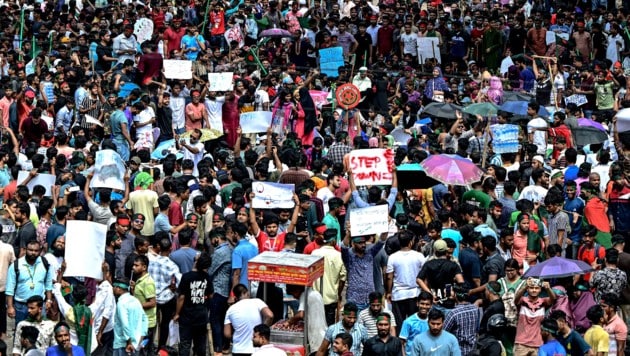Protest in Bangladesh
Parliament dissolved after the fall of the government
One day after the resignation and flight of long-term head of government Sheikh Hasina from Bangladesh, the country's president has dissolved parliament. This was announced by President Mohammed Shahabuddin's press spokesman on Tuesday. The head of state thus complied with a central demand of the students who had led the weeks of mass protests against Hasina's government. Nobel Peace Prize winner Muhammad Yunus could become a key figure in the transition.
Like Hasina, Shahabuddin belongs to the Awami League party. He was elected president by parliament last year and has more of a representative role. The parliamentary elections, which were held in January this year, took place under suppression of the opposition. The opposition therefore boycotted the ballot, which was neither free nor fair. As a result, the Awami League won again and Hasina remained in power for the time being.
Nobel Peace Prize winner as government advisor?
On Tuesday, a prominent leader of the student protests spoke out in favor of Nobel Peace Prize winner Muhammad Yunus (84) as head of a transitional government in Bangladesh. The "internationally recognized" Yunus, "who enjoys wide acceptance, could be a senior advisor to an interim government," said Nahid Islam, leader of the Students Against Discrimination (SAD) association, in a video message.
Sheikh Hasina fled the South Asian country on Monday after 15 consecutive years in power. Army chief Waker-Uz-Zaman announced the formation of an interim government. He was due to meet student leaders on Tuesday.
Number of dead demonstrators rises to over 400
At least 109 people were killed in the violent protests against Hasina and her government on Monday alone, according to police and doctors on Tuesday. It was the bloodiest day since the mass protests began in early July. According to figures available to AFP, at least 409 people were killed in total.
Pictures of the brutal riots:












Originally, the protesters had taken to the streets against a quota system for the allocation of public sector jobs, which they believed favored supporters of Hasina. Gradually, the resignation of the head of government, who has been in office since 2009, became the goal of the protest movement, which was joined by more and more people from all walks of life.
Yunus became the hero of the poorest with microloans
Yunus, now 84, founded Grameen Bank in the 1980s, which provides microloans to the poorest people in Bangladesh and has helped millions of people out of poverty. In 2006, the economist was awarded the Nobel Peace Prize for his work. For a long time, he was also seen as a possible political opponent of Prime Minister Hasina, who described him as a "bloodsucker".
"We trust Dr. Yunus," declared Asif Mahmud, another leader of the student movement SAD, on Facebook. Yunus is currently in Europe. A close associate said on Monday that Yunus had not yet received an offer from the military to lead an interim government.
Weeks of protests against head of government
The 76-year-old Hasina was confirmed in office in January in an election that was boycotted by a large part of the opposition. Her government has been accused of abusing state institutions to maintain its own power and suppressing government critics - including the extrajudicial killing of opposition figures. In recent weeks, millions of people have taken to the streets to demand her resignation.
At the very beginning of the year, before the controversial parliamentary elections, Yunus was sentenced to six months in prison and a fine by a court in his home country for allegedly violating labor law with the non-profit part of his company. Yunus' supporters criticized the verdict as politically motivated. In total, more than a hundred proceedings have been initiated against Yunus, in which he is accused of labor law violations, fraud and corruption. Yunus has always maintained his innocence.
Rival Hasina released from house arrest
Shortly before the announcement of the dissolution of parliament, opposition leader and former prime minister Khaleda Zia was released from house arrest, her party announced. "She is now free," Bangladesh National Party (BNP) spokesman A. K. M Wahiduzzaman told the AFP news agency. The politician is a bitter rival of Hasina. Zia was convicted of corruption and placed under house arrest. The families of both women have dominated Bangladeshi politics since the independence of what was then East Pakistan from the rest of what is now Pakistan in 1971. Zia was in office from 1991 to 1996 and again from 2001 to 2006, while Hasina was in power from 1996 to 2001 and from 2009 until yesterday.
This article has been automatically translated,
read the original article here.












Kommentare
Liebe Leserin, lieber Leser,
die Kommentarfunktion steht Ihnen ab 6 Uhr wieder wie gewohnt zur Verfügung.
Mit freundlichen Grüßen
das krone.at-Team
User-Beiträge geben nicht notwendigerweise die Meinung des Betreibers/der Redaktion bzw. von Krone Multimedia (KMM) wieder. In diesem Sinne distanziert sich die Redaktion/der Betreiber von den Inhalten in diesem Diskussionsforum. KMM behält sich insbesondere vor, gegen geltendes Recht verstoßende, den guten Sitten oder der Netiquette widersprechende bzw. dem Ansehen von KMM zuwiderlaufende Beiträge zu löschen, diesbezüglichen Schadenersatz gegenüber dem betreffenden User geltend zu machen, die Nutzer-Daten zu Zwecken der Rechtsverfolgung zu verwenden und strafrechtlich relevante Beiträge zur Anzeige zu bringen (siehe auch AGB). Hier können Sie das Community-Team via unserer Melde- und Abhilfestelle kontaktieren.